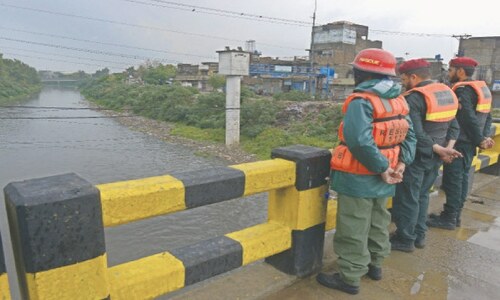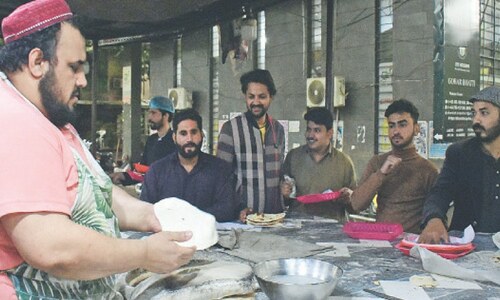ISLAMABAD: In the 18 months since the first ever civilian transfer of power in Pakistan in June 2013, the ‘quality of democracy’ has declined, a roundtable conference on the subject was told on Wednesday.
However, the upshot from the conference, arranged by the Pakistan Institute of Legislative Development and Transparency (Pildat), was that last year’s sit-ins outside the parliament that rocked the boat were directly linked to Prime Minister Nawaz Sharif’s decision to try the former army chief and president, retired Gen Pervez Musharraf.
Without mincing words, journalist Mujibur Rehman Shami claimed that he knew about the sit-in plans of Dr Tahirul Qadri and Imran Khan and the purpose was to obstruct the trial of Musharraf.
When a participant asked why he didn’t write so, TV anchorpersons Hamid Mir and Saleem Safi said that they had predicted “orchestrated sit-ins” will follow the PML-N government’s decision to try Musharraf.
Mr Safi said that Khyber Pakhtunkhwa Chief Minister Pervez Khattak and other PTI leaders had asked him to dissuade their party chief, Imran Khan, from acting on the “establishment’s advice”.
According to Mr Shami, the decision to try the former army chief for high treason had much to do with what he called the ascendancy of the military in the society during the past one year, which raised serious questions about the constitutional setup in the country.
The army seemed to be in control of the country’s security and foreign policies and the ISPR, the military’s public relations office, took an enhanced role, he noted.
“This ascendancy of military has adversely affected the quality of democracy in Pakistan,” said Mr Shami.
Study says quality of democracy declined in past 18 months
Development and Political Economist Dr Niaz Murtaza, a senior fellow at the University of California, Berkeley, told the roundtable that Pakistan must first move from being a transitional to a stable democracy before it can become a mature democracy.
Apart from the societal structures, he said, graduation from transitional to stable democracy relates to the balance of power among societal institutions.
A rethinking of the informal powers of the military is required because until armies enjoy such informal powers, chances of a formal take-over cannot be ruled out, said the scholar from Berkley, adding that Pakistan can learn from Indonesia, Brazil and Turkey in this respect.
Local constitutional expert Shahid Hamid observed that certain curtailment of civil liberties must be accepted as Pakistan is currently in a state of war. However, the establishment of military courts should not lead to complete suspension of basic human rights.
And he wanted high court judges to be included in the boards that review the cases for the military courts, short-listed through the home ministries of the provincial governments.
News analyst Ghazi Salahuddin spoke critically on the role of media in the national affairs.
Pakistan is among the countries where journalists work in an environment of fear but the media is resilient, he noted. Nonetheless, he found the media obsessed with sensational politics. This is manifested in the media’s coverage of specific events rather than taking a wider and deeper view of the systemic changes all around. When the American media pursued the Watergate Scandal, President Nixon had to resign but reporting of similar scandals by the Pakistani media would produce no substantial result, he said. This showed him the powerlessness of the Pakistani media.
A report on Pildat’s assessment of the quality of democracy in the country, released on the occasion, concluded that the quality has declined since the 2013 general elections.
Its professional report showed that the overall quality of democracy in Pakistan that stood at 54 per cent during 2012-2013 declined to 44.3 per cent by the end of 2014.
The report said among the factors that positively contributed to quality of democracy during June 2013-December 2014 include the smooth transfer of power; maturity shown by the ruling PML-N in allowing the formation of governments in Khyber Pakhtunkhwa, Balochistan and Azad Kashmir, the smooth appointment of heads of institutions such as the President, Army Chief and the DG ISI, even though the Chief Election Commissioner could not be appointed without inordinate delay; holding of local government elections in Balochistan, though in a weak form, opposition’s supportive role for the federal government in the face of protests by the PTI and the PAT and the continuing public support for democratic dispensation.
On the negative factors, the report counted the “ministerial and not cabinet form of government; formation of the National Security Committee that weakened the authority of the federal cabinet, especially in the presence of uniformed members, the Azadi and Inqilab marches of the PTI and PAT; weak performance of the elected institutions; lack of movement on local governments; increasing ascendancy of the military; media controversies and weakening of the Election Commission of Pakistan and lack of required momentum on instituting electoral reforms”.
Published in Dawn February 19th , 2015
On a mobile phone? Get the Dawn Mobile App: Apple Store | Google Play















































